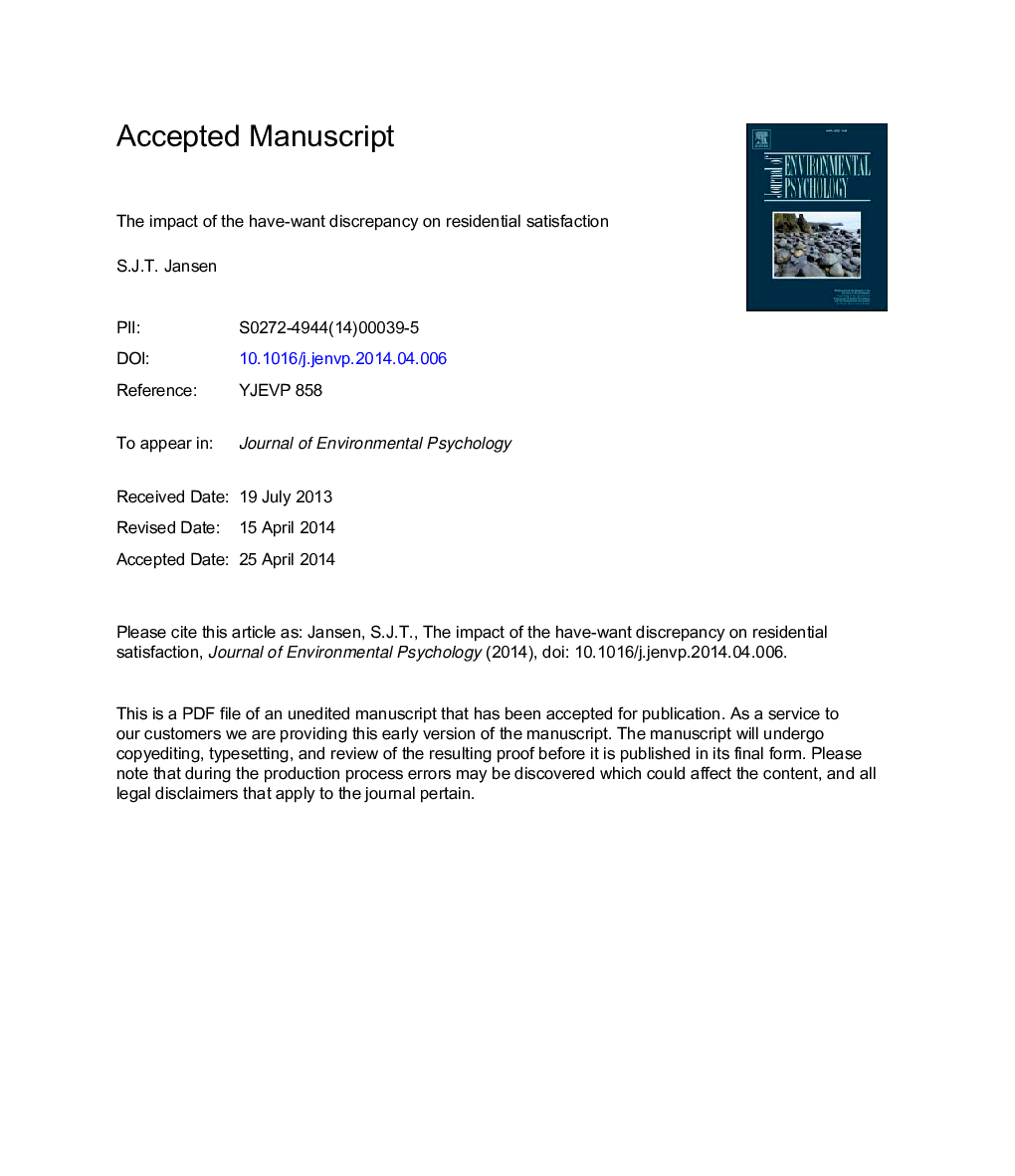| کد مقاله | کد نشریه | سال انتشار | مقاله انگلیسی | نسخه تمام متن |
|---|---|---|---|---|
| 7246100 | 1471754 | 2014 | 41 صفحه PDF | دانلود رایگان |
عنوان انگلیسی مقاله ISI
The impact of the have-want discrepancy on residential satisfaction
ترجمه فارسی عنوان
تاثیر اختلاف نظر در مورد رضایت مسکونی
دانلود مقاله + سفارش ترجمه
دانلود مقاله ISI انگلیسی
رایگان برای ایرانیان
کلمات کلیدی
مسکن، رضایت مسکونی، ترجیح،
ترجمه چکیده
رضایتمندی مسکن یکی از مولفه های مهم رفاه فردی است. ادبیات نشان داده است که رضایتمندی مسکونی تحت تأثیر ویژگی های شخصی و جنبه های مسکن (محیط) قرار می گیرد. با این حال، حتی مهمتر از آن ممکن است سطح توافق بین آنچه که دارد و چه چیزی می خواهد باشد. در حال حاضر مطالعه وقوع یک عدم انطباق برای هشت مسکن و تاثیر آن در رضایتمندی مسکونی را مورد بررسی قرار می دهد. برای جنبه های عددی مسکن، پاسخ دهندگان به سه دسته تقسیم شدند: عدم انطباق (ترجیح فضای بیشتر)، مسابقه و عدم انطباق (فضای کمتر را ترجیح می دهد). جالب توجه است که پاسخ دهندگان دوم به طور کلی دارای بالاترین میانگین رضایت مندی بودند. بنابراین، عدم انطباق در خود الزاما رضایت مسکونی را کاهش نمی دهد. تجزیه و تحلیل رگرسیون نشان داد که رضایتمندی مسکونی با ویژگی های شخصی، جنبه های مسکن و متغیرهای عدم سازگاری پیش بینی شده است. در نتیجه، این مطالعه برخی شواهد را نشان می دهد که رضایتمندی مسکونی کاهش می یابد، اگر آنچه که با آنچه که دوست دارد، مطابقت ندارد.
موضوعات مرتبط
علوم انسانی و اجتماعی
روانشناسی
روان شناسی کاربردی
چکیده انگلیسی
Residential satisfaction is an important component of individual well-being. The literature has shown that residential satisfaction is influenced by personal characteristics and aspects of the dwelling (environment). However, even more important may be the level of agreement between what one has and what one wants. The current study examines the occurrence of a mismatch for eight dwelling aspects and its impact on residential satisfaction. For the numerical dwelling aspects, the respondents were divided into three categories: mismatch (prefers more space), match and mismatch (prefers less space). Interestingly, the latter respondents generally had the highest mean residential satisfaction. Thus, a mismatch in itself does not necessarily reduce residential satisfaction. Regression analyses showed that residential satisfaction is predicted by personal characteristics, dwelling aspects and mismatch variables. In conclusion, this study provides some evidence that residential satisfaction decreases if what one has does not correspond with what one would like.
ناشر
Database: Elsevier - ScienceDirect (ساینس دایرکت)
Journal: Journal of Environmental Psychology - Volume 40, December 2014, Pages 26-38
Journal: Journal of Environmental Psychology - Volume 40, December 2014, Pages 26-38
نویسندگان
S.J.T. Jansen,
